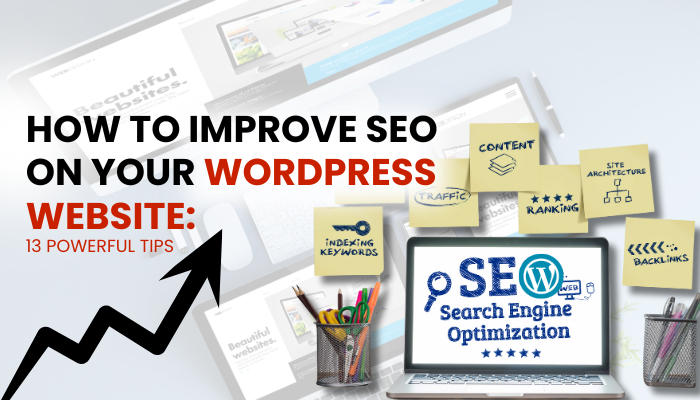Imagine having a beautifully designed WordPress Website but struggling to get traffic. You’ve optimized your design, picked the best theme, and crafted engaging content, yet your website remains invisible in search results. The issue? SEO.
Search Engine Optimization (SEO) is crucial for improving your website’s visibility, bringing in organic traffic, and ultimately increasing conversions. Whether you’re a blogger, a business owner, or an eCommerce entrepreneur, implementing the right SEO strategies can make a significant difference.
This article walks you through 13 powerful tips to improve your WordPress Website’s SEO, helping you rank higher on search engines and drive more organic visitors. Plus, if you’re struggling with the technical side, you may want to hire a WordPress developer in India to optimize your site professionally.
Optimize Your WordPress Website for Search Engines
Choose a Fast and SEO-Friendly WordPress Theme
The theme you select plays a crucial role in your website’s SEO performance. A poorly coded theme can slow down your site, affecting both user experience and rankings. Look for:
- Lightweight and fast themes like Astra, GeneratePress, or Kadence.
- Mobile-friendly design to ensure seamless navigation across devices.
- Built-in SEO optimization with clean code and schema markup.
Use an SEO Plugin for Optimization
Installing an SEO plugin simplifies on-page optimization. Yoast SEO and Rank Math are the two most popular choices. These plugins help with:
- Meta titles and descriptions
- XML sitemaps
- Canonical URLs to prevent duplicate content
- Readability analysis for better content
If you lack the technical expertise, hire a WordPress developer in India to set up and configure your SEO plugin correctly.
Improve Website Speed and Performance
Page speed is a ranking factor, and slow-loading sites drive users away. Improve your WordPress Website’s speed by:
- Using a lightweight theme and optimized images
- Implementing caching plugins like WP Rocket
- Using a CDN (Content Delivery Network) like Cloudflare
- Optimizing your database with WP-Optimize
Content Optimization Strategies for WordPress SEO
Write High-Quality, Engaging Content
Google prioritizes useful, relevant, and well-written content. Your content should be:
- Unique and informative – Avoid duplicate content.
- Optimized for keywords – Naturally include keywords without stuffing.
- Formatted for readability – Use subheadings, bullet points, and short paragraphs.
Use Keywords Strategically
Keyword research is the backbone of SEO. Find high-ranking keywords using tools like Ahrefs, SEMrush, or Google Keyword Planner. Optimize:
- Title tags and meta descriptions
- URL slugs
- Headings (H1, H2, H3)
- First 100 words of your content
Implement Internal and External Links
-
Internal linking: Connect related pages within your website to improve navigation and boost SEO.
-
External linking: Link to authoritative sources to provide additional value and credibility to your content.
Technical SEO Enhancements for WordPress Website
Optimize Images for SEO
Images can slow down your website if not properly optimized. Follow these steps:
- Use compressed images with tools like TinyPNG or ShortPixel.
- Add descriptive alt text including the keyword “WordPress Website.”
- Convert images to WebP format for better compression and faster loading.
Set Up an XML Sitemap and Robots.txt
Search engines rely on XML sitemaps and robots.txt files to crawl your site effectively.
- XML Sitemap: Helps search engines understand your site structure. Generate it using Yoast SEO or Rank Math.
- Robots.txt: Directs search engine crawlers to index or ignore specific pages.
Enable HTTPS and Secure Your Website
Security impacts SEO. Google prioritizes secure websites in search rankings.
- Install an SSL certificate for HTTPS encryption.
- Use security plugins like Wordfence or Sucuri to prevent malware and hacks.
Mobile and User Experience Optimization for SEO
Make Your WordPress Website Mobile-Friendly
Google follows a mobile-first indexing policy, meaning mobile usability impacts rankings. Optimize your site for mobile by:
- Using responsive design themes
- Testing on Google Mobile-Friendly Test
- Implementing AMP (Accelerated Mobile Pages) for faster mobile loading
Improve User Experience and Engagement
SEO is not just about search engines—it’s also about users. Enhance UX by:
- Reducing pop-ups that frustrate visitors
- Providing clear navigation with an intuitive menu
- Using readable fonts and proper spacing
Off-Page SEO Strategies for WordPress Website
Build High-Quality Backlinks
Backlinks from reputable sites signal authority to search engines. Gain backlinks by:
- Guest posting on niche-relevant websites
- Getting featured on industry blogs
- Creating shareable, high-quality content
Leverage Social Media for SEO
While social signals aren’t direct ranking factors, they help with visibility and traffic. Promote your WordPress Website content on:
- Facebook, Twitter, LinkedIn
- Pinterest for visual-heavy content
- YouTube for video marketing
Regularly Monitor and Analyze SEO Performance
SEO is an ongoing process. Track your site’s performance with:
- Google Search Console (crawl errors, keyword rankings)
- Google Analytics (traffic insights, user behavior)
- SEO tools like Ahrefs or SEMrush for advanced analysis
All in all
Improving SEO on your WordPress Website requires a combination of on-page, technical, and off-page strategies. From choosing the right theme and plugins to optimizing content and building backlinks, these 13 powerful tips will help your site rank higher on search engines.
If you’re struggling with SEO implementation, consider hiring a WordPress developer in India for expert assistance. With a well-optimized website, you’ll see increased organic traffic, better engagement, and higher conversions.
For Read More Blog – You Can Explore this Website – insidetechie.blog
 :
https://in.pinterest.com/inveduss/
:
https://in.pinterest.com/inveduss/












